An informed approach to civil engineering colleges enhances admission prospects while aligning study plans with career interests. Careful selection of civil engineering colleges demands thorough research to match academic interests with institutional offerings. Prospective applicants benefit from examining program details and career support when choosing institutions for civil engineering studies. This post highlights elements important for selecting top civil engineering colleges while engaging motivated learners.
Admission Criteria and Academic Rigour
Applicants should review eligibility requirements for civil engineering colleges to prepare well before application deadlines. Entrance exam performance and prior subject knowledge influence acceptance chances at top civil engineering colleges. Academic workload may involve technical design tasks, fieldwork planning, and report writing across multiple semesters. Understanding course load expectations helps candidates align daily study habits with expected demands.
Infrastructure and Laboratory Access
Institutions providing modern lab spaces allow hands-on practice on structural models and material tests regularly. Accessible workshops support prototype building for project courses requiring physical model creation through guided sessions. Well-equipped testing centres enable sample analysis for materials testing and durability assessments. The availability of measurement instruments for stress tests aids in understanding real-world engineering challenges.
Research Initiatives and Project Opportunities
Student engagement in faculty-led studies strengthens understanding through practical tasks and detailed report preparation. Participation in small-group studies helps apply theoretical principles to real problem statements under mentor guidance. Availability of funded project assignments provides opportunities to contribute to publication efforts or conference presentations. Regular project showcases encourage peer feedback and demonstrate applied skills to future employers.
Technological Tools and Software Training
Training in design software provides familiarity with drafting platforms common in industry-related tasks over semesters. Workshops on simulation tools support detailed analysis of structural behaviour under virtual load tests. Access to computational resources allows modelling scenarios for bridge design or load distribution studies. Familiarity with data handling software aids in managing survey results and site assessment reports.
Affordability and Scholarship Options
Fee structures differ significantly across institutions, affecting overall academic investment over full program durations considerably. Merit awards and need-based support help reduce financial burdens through targeted grant programs where available. Transparent breakdown of tuition components allows families to plan budgets ahead of enrollment cycles. Early inquiry about payment schedules helps avoid last-minute funding challenges during semesters.
Campus Environment and Peer Community
Campus clubs focused on technical topics create collaborative settings where peers work on model projects together. Social activities outside lecture hours boost morale and help maintain a healthy study-life balance among students. Peer-led study groups facilitate shared problem-solving sessions for structural design or material science topics. Networking events among student organizations introduce contacts for collaborative projects beyond course requirements.
Conclusion
Balanced evaluation of academic factors, practical exposure and cost considerations leads to informed choices in civil engineering colleges. Methodical assessment of each factor guides applicants toward institutions aligned with long-term career objectives before enrollment. Review options early and maintain organized records of application requirements and deadlines for admission success. Prospective scholars gain confidence when decisions align with career goals and available resources before application deadlines.






